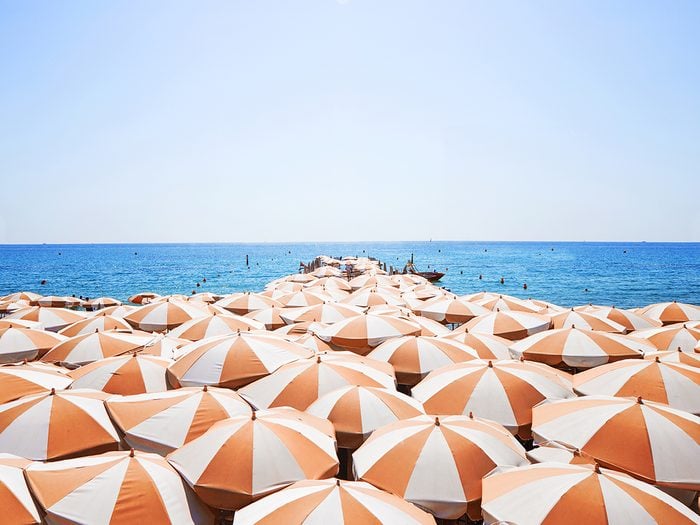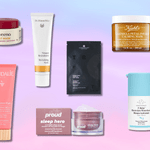8 Simple Tricks to Better Protect Yourself From the Sun

Toronto dermatologist Dr. Renée Beach shares safe and convenient ways to practice sun safety year-round.
A few years ago, I booked a consultation with Paris-based cosmetic doctor Dr. Jean-Louis Sebagh, who has been described as the man “behind some of the world’s most radiant faces.” (Think Cindy Crawford.) I wanted to know how I could tweak my beauty routine in order to keep my skin healthy and looking youthful for as long as possible. Sebagh, whose name now appears on a range of anti-aging and skin care products, gave me simple advice: “Stay out of the sun.”
Since that appointment, I’ve wondered how a dermatologist would rate my sun-dodging ways. Although I excel in the “remembers to apply SPF daily” and “always chooses the seat in the shade” categories, I’m less diligent about reapplying sunscreen or avoiding peak sunshine hours (10 a.m. to 3 p.m.). So, is it possible to “stay out of the sun” without hindering your lifestyle?
“In Canada, we wait so many months for [sunshine]—it’s our lifeblood,” says dermatologist Renée Beach, founder of DermAtelier on Avenue, a medical and cosmetic dermatology clinic in Toronto.
Beach doesn’t want to be “the Grinch who stole sunshine” by advising clients to avoid the sun completely, so she suggests being safe, but reasonable, with sun protection. “Would I ever buy a convertible? Absolutely not,” she says as an example. “They’re fun, fun for joy and leisure, but not great for skin care.”
For those of us who are fans of both sun protection and fun, Beach shares eight simple tricks for safely enjoying the sunshine.
Skip the moisturizer
In the summer months, chances are you can skip the moisturizer and go straight to sunscreen, as it contains moisturizing properties. Plus, layering too many products can cause skin to look and feel greasy. “I find with our humidity this time of year, moisturizer often isn’t necessary,” says Beach. But if you do have dry skin, Beach suggests letting your moisturizer dry before applying sunscreen.
Apply more sunscreen than you think
Beach says most people aren’t applying enough sunscreen. “The amount that we should be applying to the face is a quarter teaspoon,” she says, “and a half a teaspoon if we’re doing face and neck.” As for your body, you’ll want to apply about one ounce—enough to fill one shot glass.
Don’t forget to cover other important zones
You probably know the most-forgotten spots to apply sunscreen—ears, back of neck, feet—but there are other areas that need special attention, too. The scalp, for example, requires protection, and the best way to shield it from the sun is to avoid exposure from 10 a.m. to 3 p.m., and consider wearing a hat. “There are beanies that fit well to the skull and are very protective with blocking out about 99.8 percent of ultraviolet radiation,” says Beach.
Another don’t-miss area is the hands. Ideally, we’d be reapplying sunscreen after every hand-washing, but that’s not realistic. Beach says if you’re going to be doing outdoor activities, like cycling, in which your hands are directly exposed to the sun, a more practical solution is to find gloves that offer UV protection.
Wear a foundation or tinted moisturizer with iron oxide
If you wear tinted moisturizer or foundation over sunscreen, opt for one that has iron oxide in it. “Iron oxide can prevent against pigmentation changes for people who have melasma or inflammation leftover from acne,” says Beach, explaining that it protects skin from darkening or reddening in the sun.
Carry SPF in a stick or powder form for midday touch-ups
“Reapplication is important but mostly depending on one’s activity level,” says Beach. “If you’re moving about quite a bit and a reasonable amount of sunscreen is being sweated off or coming off on your mask, then definitely reapplication is important.”
She recommends sunscreens in stick or powder forms, which can be more convenient than a liquid version. “Sticks are practical because they can get very precise areas as opposed to a cream that’s going to be a little bit more challenging to rub in,” says Beach. “A powdered sunscreen is good for getting rid of shine, but also to be able to provide some protection.”
Try La Roche-Posay’s Anthelios Targeted Sun Protection Stick SPF60 for Face, $21, shoppersdrugmart.ca or Supergoop’s (Re)setting Powder SPF 45, $40, sephora.com.
Practice sun-safety in the car, too
Being behind the wheel doesn’t offer much sun protection. In fact, after 28 years on the road, a 69-year-old truck driver had visible sun damage on the left side of his face, the side closest to the window. What’s the solution?
“One of the most important things to do in cars is making sure your sunscreen has UVA protection,” says Beach. “UVA goes through windshields, and that’s more related to aging.” She also advises using the in-car sun visors, which can help with protection.
Look for the shady spot
“Shade protects you from UVB,” says Beach. “UVB is related to things like sunburns and skin cancers.” She recommends walking on the shaded side of the street, opting for the shaded patio seat and wearing a hat with a five- to 10-centimeter brim.
Follow these tips no matter your skin tone
The idea that individuals with darker skin tones don’t need sun protection is a common misconception.
“People with lighter skin tones are represented more frequently with skin cancers,” says Beach. “With brown and black skin tones, it’s not as easy to see a tan, and they don’t have as high numbers of skin cancer, but there are certainly pigmentation changes.” Finding a good sunscreen can be hard for people with darker skin tones, as many formulas leave a white residue behind.
The most important thing is to find a sunscreen that works for you, whether that means something mineral, something for acne-prone skin, or something that goes on clear. The best sunscreen is the one you’ll wear.
Next, discover the best sunscreens for dark skin.




